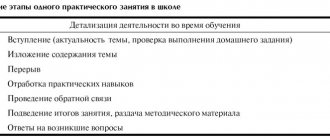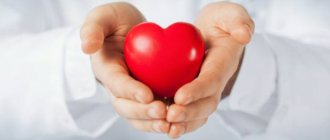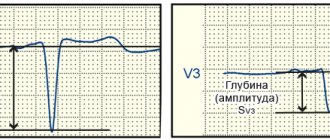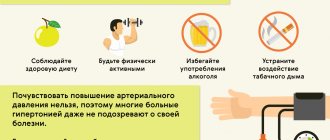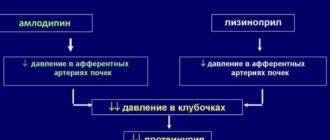ECG with stress is a type of study of cardiac activity that allows us to identify hidden pathological processes that appear only under special conditions when the heart experiences additional stress.
At the Moscow clinic "Alpha Health Center" you can undergo this type of diagnostics to check the functioning of the cardiovascular system. Stress tests are carried out as part of medical examinations and when examining people suffering from heart disease or those at risk.
When is a stress ECG necessary?
Indications for the procedure are:
- pain behind the sternum in the heart area;
- minor changes in the electrocardiogram, insufficient to make a diagnosis;
- lipid balance disorders without obvious signs of ischemic disease;
- risk of myocardial infarction.
Many diseases can only be determined if an ECG is performed with physical activity. The functional diagnostic method is used to determine permissible loads after bypass surgery, angioplasty, and myocardial infarction. The study may be aimed at assessing the effectiveness of the therapy.
Uninformative test
The test can be stopped due to severe shortness of breath, pain in the joints or legs until the patient reaches a submaximal heart rate when performing a low or medium power load (less than 150 watts), while clinical and electrocardiographic criteria for stopping the test are not noted. As a rule, patients in these cases do not achieve submaximal heart rate. The results of such tests are regarded as uninformative.
Exercise tolerance allows you to evaluate the effectiveness of treatment and rehabilitation measures.
During physical activity, blood pressure increases. At initial systolic blood pressure 160 mm Hg. Art. or more, the test should be abandoned if during the test the blood pressure rises to 230 mm Hg. Art., the test should be stopped. The test results are assessed according to generally accepted criteria; the type of circulatory response to stress is additionally assessed as hypertensive (inadequate increase in blood pressure at each level of load).
Features of the method
When checking the electrical activity of the heart, they evaluate how the myocardium responds to stress load. Testing is carried out in a safe clinical environment. Doctors receive objective data on the work of the heart when the human body is in motion.
An exercise ECG test compares coronary blood flow during exercise and at rest. The study evaluates the regularity, frequency and duration of heart contractions, as well as the ability of the cardiovascular system to cope with stress and supply blood to the myocardium.
The obtained results of the stress test help to identify pathologies of cardiac activity, including coronary disease, and also reflect the physical condition of the patient.
Who is an ECG indicated for?
This study is indispensable if:
- a person has been diagnosed with rheumatism;
- surgery is pending;
- the patient complains of discomfort, pain in the chest and especially in the heart area;
- there is shortness of breath, heart murmurs, general weakness;
- the patient suffers from arterial hypertension (hypotension), arrhythmia;
- there are suspicions of developing or existing heart disease;
- there are certain diseases of internal organs, diabetes mellitus, and other diseases of the endocrine system;
- the subject is over 40 years old;
- the patient is expecting a child;
- There are aggravating factors such as smoking, regular drinking, high cholesterol, etc.
1
ECG in "MedicCity"
2 Electrocardiography in “MedicCity”
3 ECGs in "MedicCity"
Types of load tests and features of implementation
- Functional tests. Such a cardiogram is carried out when assessing the health of military personnel, pilots, and athletes. Using the equipment, the endurance of the heart is assessed and hidden pathologies are identified. Tests are used in a standing position, lying down and during squats.
- Bicycle ergometry. This exercise ECG test is performed on equipment that resembles a bicycle. The equipment records changes under load. This is how ischemia, heart rhythm disturbances and other pathologies are determined.
- Treadmill testing. Electrocardiography is carried out on a special simulator - a treadmill. The load is dosed by tilting the blade. This device can be used to examine people without weight restrictions.
Regardless of the type of ECG, the procedure begins with fixing the electrodes on the patient’s chest. An electrocardiograph takes readings through electrodes and records them in an electrocardiogram. Data are recorded in a quiet position and under load for later comparison.
We have experienced doctors who will decipher the equipment data in detail.
What stress tests will a cardiologist suggest?
The type and duration of EGC examinations differ. Depending on the indications and goals, the cardiologist may offer the following tests:
Load tests (Step test). A simple type of diagnostics that does not require special equipment. First, an electrocardiogram is taken from the patient at rest. Then he performs several exercises (running, walking in place for 2 minutes, 20-30 squats). After this, another cardiogram is recorded, the data of which is compared with the first results. In some cases, another ECG is performed, for example, 3 minutes after exercise.
Bicycle ergometry. A person exercises on a bicycle ergometer (a special bicycle connected to a computer). In this case, the intensity of the load may change. It all depends on the purpose of the examination. The device records indicators at rest, during the test and after exercise.
Treadmill test. It is carried out on a treadmill, which allows you to more accurately change the load and speed of the moving belt, adjusting it to each person being examined, even for a child.
Advantages of diagnostics in our center
- Conducting tests with decoding under the supervision of experienced diagnosticians.
- The opportunity to complete all consultations and studies in one place. You can get tested and have an ultrasound of your heart.
- The clinic has modern equipment that allows you to obtain accurate test results. The examination is comfortable and safe for patients.
- Affordable price. We have a reasonable price for a stress ECG; the cost of the service includes a conclusion.
- A complex approach. Immediately after an ECG with a stress test, you can visit a cardiologist for a detailed consultation on the results of the study. The doctor will draw up an individual treatment plan based on the data obtained and anamnesis.
ECG (electrocardiography) is a popular method for studying the heart muscle, which has been actively used in cardiology since the beginning of the 20th century. It allows you to independently diagnose many heart diseases. However, there are cases when certain disturbances in the functioning of this organ can only be seen during an attack. A stress ECG method was developed specifically for this purpose. It involves provoking the body to develop an attack and recording data on the work of the heart muscle at such a moment.
A stress ECG suggests the following methods for diagnosing hidden disorders:
- functional tests;
- bicycle ergometry;
- treadmill;
- Holter monitoring.
All of the above methods are used by our Khabarovsk diagnostic. Let's look at each of them in more detail.
Functional tests
This is the simplest and most accessible way to diagnose hidden heart pathology. In order to make an ECG of this kind in Khabarovsk, you only need to have an electrocardiograph and a stopwatch. In this case, the permissible ability of the heart to withstand physical activity, as well as the recovery period after it, are determined.
The patient is asked to perform various physical exercises and the length of time during which the myocardium returns to its normal state is recorded. Typically the recovery period lasts 3 minutes.
What is included in functional tests:
- Martinet method (20 squats);
- run;
- step tests;
- clino-orthostatic test for children.
Functional tests are carried out to assess the professional suitability of military personnel and athletes. In this way, schoolchildren are determined by their health group, which is important for attending physical education and some sections.
Bicycle ergometry
In this case, a stress ECG is performed on a special bicycle, which sets the intensity of pedaling. The method is very informative, helps to diagnose angina pectoris, identify cardiac ischemia, heart failure, latent arterial hypertension, as well as evaluate the dynamics of the disease and the effectiveness of selected therapy.
It is carried out for patients from 15 to 75 years old.
Treadmill
Similar to the previous method, only a treadmill with an incline is used as sports equipment. Each certain period of time the angle of inclination increases. Data from the electrocardiograph is recorded during and after the test walk, then a comparison is made with normal values.
Even a child can get an ECG of this kind in Khabarovsk.
Holter monitoring
This type of study of the heart muscle can only partially be called the ECG method with stress. A special device is fixed on the patient for a day and measures heart activity while performing common household tasks. A person should spend this day in his
normal rhythm, recording in detail all actions in the diary (the accuracy of interpretation largely depends on this). The method has no contraindications.
If you need to have an ECG done in Khabarovsk, please contact our diagnostic center.
Sign up for an ECG with physical activity in Moscow
To undergo the examination, we suggest calling the administrators of the Alpha Health Center. We will select a convenient time to perform a stress ECG in our clinic in Moscow.
You can immediately make an appointment with a doctor to consult on the test results. We offer to complete all procedures and consultations on the same day, subject to availability.
Pay attention to our comprehensive body examination programs - this is an opportunity to perform a total diagnosis at a competitive price. You can check the cost of services in the price list on the website or by phone.
Explanation of the examination
The essence of electrocardiography is to determine the electrical potentials of cardiomyocytes detected by sensors. Electrical impulses are converted into a graphic image. Using an ECG, you can analyze the features of the anatomical position of the heart, identify heart rhythm disturbances, suggest the presence of enlargement of the heart chambers, and assess the quality of myocardial nutrition. An experienced doctor will decipher the results and issue a detailed conclusion, which is accompanied by a graphic image (electrocardiogram film).
Are there any contraindications to the study?
Absolute contraindications to cardiac stress testing include acute myocardial infarction (including the presence of new left bundle branch block, high-risk unstable angina, symptomatic severe aortic stenosis, uncontrolled arrhythmia causing symptoms or hemodynamic instability, unstable heart failure, acute pulmonary embolism, and acute aortic dissection.
Relative contraindications include left coronary artery stenosis, severe hypertension, electrolyte abnormalities, hypertrophic obstructive cardiomyopathy, and uncontrolled arrhythmia. If there are relative contraindications, the test may be performed if the benefit of detecting ischemia outweighs the risk of the test.
ECG, how to prepare
Contrary to the opinion of cardiologists, it is generally accepted that an ECG does not require special preparation. Studying the functioning of the heart muscle involves avoiding stress, fatigue, and requires complete rest. On the day of the procedure, you need to get a good night's sleep and ignore morning exercises. If the procedure is scheduled for the morning, then a heavy breakfast should be avoided, or better yet, abandoned altogether. For an upcoming daytime procedure, you should limit yourself to a light snack 2 hours before the session.
Remember to reduce the amount of fluid you drink that affects muscle function. Avoid coffee, tea and other energy drinks. They will stimulate cardiac activity, and the results will be distorted.
It is advisable to take a shower. There is no need to apply care products to the body, because the components of creams and lotions will contribute to the formation of a greasy film on the surface, which will negatively affect the contact of the electrodes with the skin.
Immediately before performing an ECG, try to relax as much as possible. Sit with your eyes closed and restore your breathing - this will ensure an even pulse and objective readings from the device.
